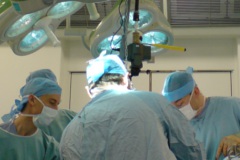|
|
‘Surgery cures more patients than any other intervention’ |
The charity’s research programme funds studies that investigate how to improve survival and quality of life that patients can continue to enjoy after cancer treatment.
Research Principles
The following principles guide the charity’s research grants programme:
- Relevance to the cure of bowel cancer and associated liver secondaries
- Advances in quality of life for patients with bowel cancer
- Excellence, timeliness and originality of science
- Avoidance of duplication
- Publishing and dissemination of research findings
Research Priorities
- Clinical rather than laboratory based research for bowel cancer and associated liver secondaries
- Research that advances precision diagnosis, surgery and treatment
- Studies that include the multidisciplinary perspective for the treatment of bowel, cancer and associated liver secondaries
- Relevance to the diagnosis, staging and treatment of bowel cancer and associated liver secondaries
- Translational research for the treatment of bowel cancer and associated liver secondaries
- Research that can contribute to education programmes for multi-disciplinary cancer teams
Types of Grant
Grants are available where the principal investigator is based in a recognised research centre, university or hospital. Centres outside the UK may be considered if the application is partnered with a project within the UK.
The following types of grant are available:
- Pilot or feasibility study
The charity’s trustees, taking advice from the Pelican Research Review Panel and using the agreed process of peer review, are responsible for approving awards and grants. The charity is mindful of the value of flexibility and rapid response where this can be achieved without compromising the principles of peer review and best practice.
The charity’s grant applications will be assessed for effectiveness and outcomes to ensure that progress towards improvements in treatment is delivered.
